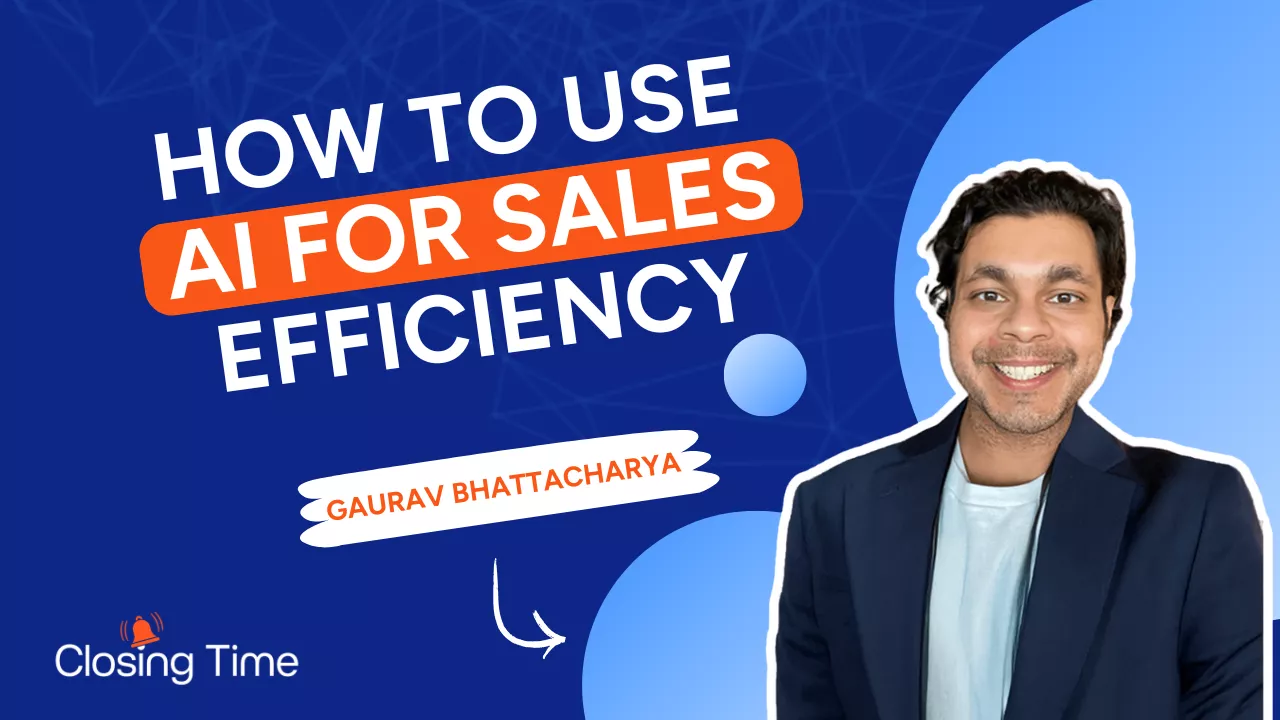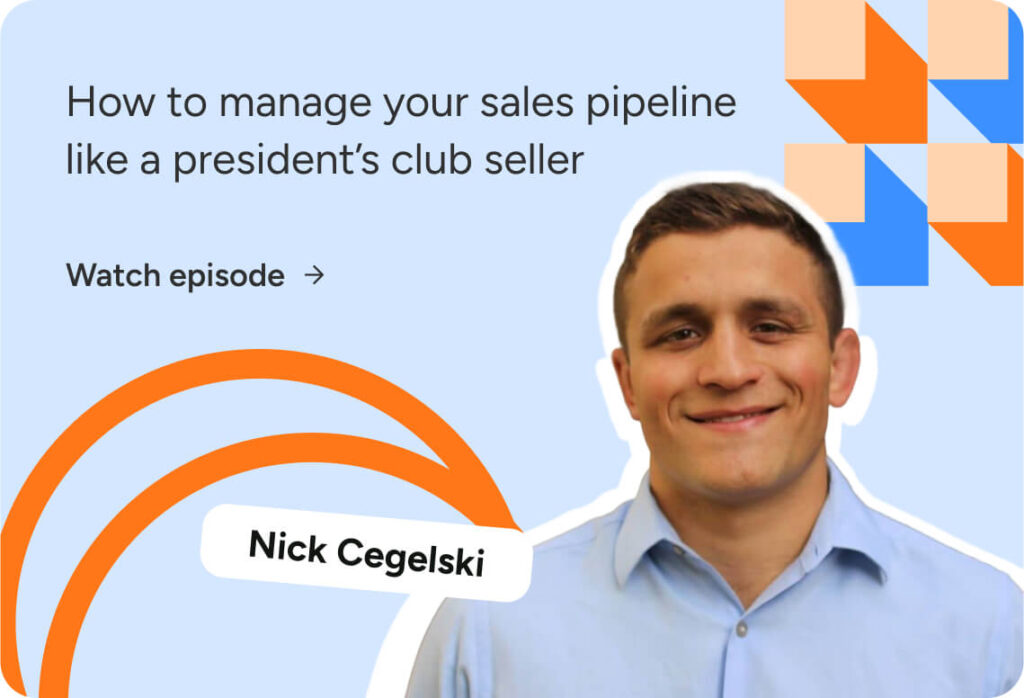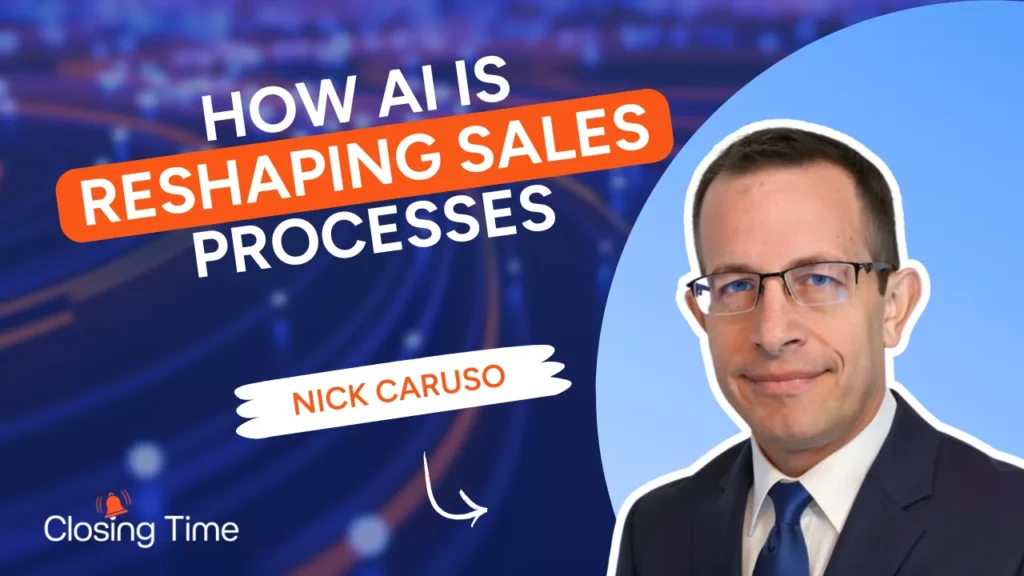Are your sales reps using AI every day to make their jobs easier?
If not, you’re missing the boat.
Let’s talk about practical tactical uses of AI in sales
in this episode of Closing Time.
Thanks for tuning in to Closing Time, the show for Go to Market Leaders.
I’m Val Riley, head of marketing for Insightly Unbounce and LeadsRx.
Today I am joined by Gaurav Bhattacharya.
He is the CEO of Jeeva.ai, an agentic. AI company.
Thanks for joining us today. Hi.
Thanks for having me, Val. I’m very excited to be here. Awesome.
Well, this statistic is quite shocking.
I got it off your website.
It says 72% of a sales person’s time is spent on manual tasks.
That figure should send any sales manager spiraling.
Where did that data point come from, and why should that be a wake
up call for sales leaders?
Yeah.
It’s a really old report, so it almost feels like that
actually could be even more now.
It was done by Harvard Business Review, alongside Gartner, where they evaluated,
I think it was close to a thousand sales reps on average from different industries.
And they said that 72% of the time sellers spend time on non closing tasks.
And when I say non closing tasks,
it doesn’t really mean not even talking to customers or
or which which would be even even more. I think. Right.
If you think about it, 90% of the seller’s time probably goes into
not doing discovery calls or demos or closing or negotiating deals,
but probably on manually enriching leads, enriching data,
doing like personalized outreach, just chasing, cleaning CRM,
just trying to figure out doing strategy like which deals to go after.
And it also actually does not include anything that related
to following up on actual pipeline and deals.
So majority of sellers time goes into,
just just doing manual, repetitive, labor intensive tasks,
which kind of takes them away from not being able
to close more deals and, and even, or chase bigger deals.
Okay.
Gosh, I’m excited about this episode because I just want to share
with our sales leaders and our sales, salespeople all these great tips.
So today, let’s talk about ways
that AI can help sellers be much more efficient.
First, you point to the fact
that AI can do some research ahead of a call.
Yeah. Yeah.
That was that’s my biggest, fastest use case, Val.
Because, what I’ve noticed is, and I think this is,
is is like a universal truth here, where, where people buy from people they trust.
And the first thing you can do to build trust
if you don’t have a relationship already is to come off as an expert.
So as a salesperson, what I’ve always learned and what I’ve seen, having worked
with thousands of salespeople now, building this product, what I’ve noticed
is that the easiest way to build trust is come off as an expert in your industry.
So if you’re going to meet someone in, let’s say, a manufacturing company
with more than 500 employees, who you’re meeting the CIO, you, you,
if you knew about
what other pain points other CIOs have, if you know about that CIO’s background,
where they went to school, what have they done?
What’s happening in the company?
What was the CEO’s last webinar?
What was the last press release?
If you just have these small tidbits
of information that makes you feel like you’ve done
your research, you’re an expert in the industry.
You just built instant credibility and instant trust.
And that’s like the fastest way of using AI.
A lot of sellers feel that maybe using ChatGPT to write a different email
or better email or writing. LinkedIn messages is the easiest use.
But probably the best use of your time is is doing
deep research in a prospect in a company.
And what I recommend is using perplexity
because it has the ability to scrape a person’s LinkedIn profile.
Summarize webinars and podcast
so you can write a prompt which would be like,
imagine you’re a deep researcher working for my company.
Here’s a prospect. I’m meeting. Here’s a LinkedIn profile.
Here’s the company.
Just do as much research as possible on this person.
Give me tidbits about everything from funding history to webinars, snippets
to what could be opening lines and angles that I can pitch this person
just like their style, how they communicate.
Perplexity is crazy at that.
I don’t know how they do it, but they’re able to scrape everything.
They’re able to crawl different web sources,
summarize the information for you.
Takes about two minutes of your time, but you would go heavily prepared.
And that’s why that, in my perspective, is the fastest,
use of AI to helping salespeople and go to market teams at close models.
Right.
Because you would think in the past that was a necessary step.
But for a salesperson to do that, they would have to first
go to that person’s LinkedIn profile, pick some stuff out,
look at some recent posts, pick some stuff out.
Go to the company’s, press release page.
Pick some stuff out, maybe check the news
and then combine all that into 3 or 4 paragraphs.
Right. That takes a lot of time.
But, you know, like you’re saying perplexity does that in in minutes.
That’s exactly right.
Yeah. A couple of minutes and it’s going to go very deep.
Not just shallow.
It can crawl multiple pages.
It can go into every single page of the website.
So a really funny example that we have built into Jeeva, But
you can do this manually or in like a tool like perplexity
also is let’s say if you are, if you have a 100 prospects
that you’re going after in a week or in a month and 100 companies,
you can almost run a research where you can upload that table or CSV and say,
go to everyone’s website and figure out whether they’re SOC 2 compliant or not.
I’m making an example and just go and say that when did they
when they or for illegal someone selling into legal tech,
you know, just talking to a salesperson right before this
and I was giving them an example of like, you can upload a list and just say
that, go and figure out when did the last file their patent?
Do they file patents or not?
How many patents have they filed
like these kind of nuanced researches just have you so mean so much prepared.
Now imagine if I’m a salesperson selling a legal tech.
I can go in and say that, hey, we saw that you started filing
patents about three years ago, but you haven’t filed anything recently.
Can we help you with that?
Can we accelerate that timeline for you?
I think these kind of things just make you come off as, like,
a deep expert in the industry, so it cannot be just.
It just doesn’t have to be very.
It can also be very nuanced searches for, you know, for for each environment.
but I think that’s a great point, because that information is out there.
But unlike LinkedIn,
searching a legal website or a government website is very arduous.
And so I think it’s just about learning
to write the prompt the right way to save time.
I’m I’m imagining my sales team, and they have like four calls that day
and they write an amazing prompt for AI, to research these four people.
And then they go make their coffee and they come back to their desk
and there’s their research. It’s done for them.
Yeah. That’s exactly right, Val.
Yeah.
One of the, features
I love about ChatGPT or perplexity, even, is a deep research feature.
But you can write a prompt.
Let it go. Let it run for 15, 20 minutes.
And by the time you have your coffee or,
you know, your morning chatter and your back or your,
you know, whatever your morning walk
and then and everything’s done for you
and you just have to go through the snippets,
write these notes and sticky notes.
And while are you ready, write this
this in itself, I feel when I was selling,. I’m an engineer as well.
So I say I learned sales the very hard way.
As a founder,. I was basically the first BDR.
I was always the first sales rep.
I was trying a lot of different things, and one of the things I worked for me
was this deep research.
I would always know everything about the prospect and the environment.
I would try to come off as an expert, and I would do a lot of reflective
listening and try to kind of regurgitate back what I’m hearing.
These small things did much better, but. I would have these sticky notes of these
different points about this person and what I found, and I would try to like,
weave that in, in the conversation
somehow just trying to show that I’ve done the research.
It would take me hours, like literally like I remember one of my biggest deals
that I’ve closed in my career, beyond like fundraising, I would say,
was Verizon.
It was a $1.5 million contract that we ran for three years.
And and by the time I was running that deal cycle,
I would wake up in the morning and almost like as if it’s an exam,
I would be preparing about Verizon every single morning I wake up.
And I had all my news
and Google like alerts on everything going on with Verizon, Verizon Media.
If they’re acquiring something, what’s going on? Right.
Like just trying to just stay on top of it every single day for at least 30
or 60 days in that negotiation phase, obviously deal took much longer,
but just in that 30, 60 days. I knew everything about,
like the entire buying team, the 13, 15 people that I was following.
What’s going on in the company?. What’s the CEO saying?
Because we knew that for our size of company,
we were getting $5 million, almost like it was a three year contract.
It would be game changing for us, and it was, but it took me so much time
and effort.
I was thinking that if I had AI,
I would just like wake up to fresh news every day without having to like,
you know, go through every all the pain that I did.
But that’s what’s needed to really close, like, especially bigger deals.
But now every deal. Right?
Every deal.
I think that’s key.
Okay, so we talked a little bit about research ahead of a call,
and you have some good tips for using AI for call follow up.
Yeah, totally.
So there’s a couple of things that I love doing.
And there’s tons of note takers, obviously.
Like we’ve tried to build this in Jeeva as well, but there’s free note takers.
Like fireflies fathom that you can have in the call.
There’s a really cool tool that I think. ChatGPT is about to do this soon,
but there’s a there’s a tool that I store. I use called granola.
And what you can do is
you can basically have it run in the background every single day.
It’s going to auto detect which calls are you on
and to you can be any call on your computer.
You can if you have your computer on it can actually even record.
Obviously you have to ask for consent and you have to make sure that
people are okay with it.
But if you do that, then
it would understand when you start a call, it can understand different speakers.
It can just summarize every single note for you throughout the day.
And what we do now, in addition in Jeeva is we just even draft a follow up email.
So imagine if you’re on a call, we would hear the action items
and we would basically say, hey, John and Tim, it was great meeting you today.
By the way. Here’s what we discussed.. Here’s action items that you have.
Here’s action items that I have. I’m going to send you a proposal.
Here’s a calendar invite that we discussed on the call for next Tuesday.
Just and it’s a draft, but you don’t send it out.
It’s ready to go
so that the rep can just say proofread, edit and send and book a meeting.
So post call, follow up is like a really important step for every salesperson.
And I judge that right.
If you think about it, the best salespeople are great at a they’re great
at follow up, they’re super persistent, they’re going to follow politely.
They’re very good, very organized.
And the worst salespeople. I’m sure you’ve seen this.
And in your career, you talk to them.
Maybe you interview them
or you have a sales call and you don’t hear back for two weeks.
Have you have you had that where you did a demo
and it was like a great demo, or you interviewed a salesperson
and they don’t even send a thank you note or they don’t reply to you,
and next Tuesday you would be like, oh, it’s great talking to you.
Here’s the proposal. Right?. And it’s already too late.
Now your mind’s already off to something else, doing something else so quick
follow up is key.
And and there’s like tons of tools out there that sellers can use to
just, you know, get the actions, get a draft ready
so they can quickly send it out and just look like, look like experts.
Yeah.
It pains me if it’s a product that I really want to buy.
But the sales experience was terrible, and I still end up buying the product,
like I think.
I think I die a little bit inside when that happens.
But let me ask a follow up question there, because I do love that feature.
So it’s drafting an email for you based on a meeting.
Are your, in your experience, are sales reps typically just sending that email
or do they spend time sort of editing it so it fits their voice
a little bit better? Yeah, yeah.
And so so I think in the future, Val, this is going to happen.
AI is going to do this automatically and we’re going to have one universal AI.
I truly believe that, you know, somebody would do it like Google or OpenAI.
As of now we have a really cool feature.
And we we would do this.
So what I what I would do is every time I would when ChatGPT
first came out, 3.5 was horrible at emails.
It’s still not good.
But what I would do is I basically took all my sent emails, like 100 of my emails
I recently pasted to ChatGPT.
I said, this is how I write emails.
First, learn how I write emails and then write emails for me.
So and and that worked really well for me.
So we were like, hey, we should build that as a feature in Jeeva.
So for people who are not using Jeeva AI, what they can do is they can just pass
like 20 of their best emails that they’ve written and they can send it
to ChatGPT and in the same thread, just ask for new emails.
But what we do
is we create a style guide, Val, which I feel a lot of products can do.
But let’s say if I if you were using something like a Jeeva AI,
we would actually go in and learn like your last 300 emails that you written.
You’re going to understand from those emails.
Try to understand your persona, your style,
how you write copy, what words you use, what you don’t use, what’s your sign off,
what you’re greeting.
But moreover, it will try to create a persona map for you.
Like who are you as a person?. Are you decisive?
Are you like, do you say no to product pitches?
Do you say yes?
Are you experimentative, are you quick to respond like there’s so much things?
Like literally with these 300 emails, it feels like we can learn your life, right?
And if you consent to it, we would use that to draft everything.
So the short answer to your question is, what we have seen
is that in the beginning, reps would change 90% of it.
But now I think only 3% of emails get changed or edited.
It’s usually perfect.
A lot of feedback we get from the people who use
our product is like, man, this feels like I have written it right?
Like sometimes I get confused whether it’s my draft or Jeeva created this draft.
So which which I’m really proud of.
It’s a one of one of the best, one of our best features.
I think.
Okay, as I would say, as a writer, that.
That scares me and excites me at the same time.
What about objection handling?
I’ve seen AI try to work on that with mixed success.
Is there a tool that typically we could use
with AI built in to get ahead of objections?
Yeah, it’s a great question.
So there’s a tool, Hyper bond, which is like a sales training tool
for objection handling.
Then there are other tools.
as well, where you can record calls and or you can create a persona
and you can practice with them on different objections.
Then there are life tools.
So zoom use zoom
was trying to build this feature, but I know Zoom Info has this feature.
Outreach. IO has this feature. It’s expensive.
Kong has this feature where during the live call,
they’re basically going to show you if someone has an objection,
they’re going to quickly query the DB like a database,
and they’re going to try and show you what the objection is
and what the what the actual response would be.
In short, I don’t think these worked really well because what
I have noticed, Val
and I think
I think you probably would agree with this,
a lot of objection handling is not just answering
the question, but is how you handle the objection.
So as a salesperson,
a lot of times when you objection, you know, there’s an objection.
We train our sellers, or at least what I’ve learned is
you start by asking a lot of questions, and you can start by reflective listening,
which is like, you know, Val, sounds like pricing is really important for you.
And you noticed at our pricing was, you know, let’s say $3,000 a month,
whereas a lot of the competitors you mentioned are charging $1,900 a month.
And I first capturing that correctly, like,
you want to make sure that what makes us different so that we’re
at almost like $12,000 more expensive a year, did I capture that correctly?
Right. So it’s reflective listening.
And then once you get that back, you can ask more questions
and you can frame it in a way that understands their priority.
There’s a lot of nuances to objection handling.
It’s not just a cookie cutter answer.
And that’s why I think it doesn’t work really well.
What does work is those training platforms you get to practice objection
handling and get training before the call.
So I would say those are really good.
The, the, the live objection handlers haven’t worked that well.
Or at least like not yet.
They’re not good enough yet.
Got it.
Okay, let’s switch gears a little bit.
Everyone likes to talk about today’s buyer
and how they are so much more savvy and further down the funnel due to AI.
I mean, back in the day, you really did have to sit a demo,
see the slides to really understand what an offering is.
and today you can really do so much of that as a buyer.
So how is that changing the role of the salesperson?
It’s crazy, Val.
I feel it’s that every morning. I wake up, there’s somebody who
messages me and says, oh, the salesperson is going to die.
We all need salespeople anymore.
I’m sure you’ve heard that as well.
Is like, every morning we’re like,
I think, I think the world is going to need even better salespeople and much
many more salespeople, because selling anything is getting really hard.
There’s obviously people who buy stuff all the time, right?
They ChatGPT viral product.
There’s tools like lovable cursor windsurf, like you hear these stripe
like solutions that are just like Unbounce,
right, is another one we use and we love it.
We never talk to a salesperson.
It’s such a great product.. It works on its own.
So there’s a tool that just work.
And they’re amazing, right?
They’re just great great products and and and but you can buy those for $90
a month, 20 bucks a month,
maybe $50 a month for anything that is maybe 3000, $5,000.
It’s getting so much harder to convince the buyers why they need it.
And in sales, one of their hard, they, there’s three things of like
why people buy anything.
It’s basically like why do anything?
Which is number one, why do it?
Why do it now?
And why do it like with this particular product.
Right. So even for our salespeople, we have to train them.
You have to convince the buyers why do anything?
Because the status quo can just be using spreadsheets.
And why do it now, right.
What is the urgency for them?
They can just do this six months later or nine months later
or and why do it with Jeeva. AI versus all the other tools?
So and this is the same question that it has to be answered for everyone.
What’s happening now is that without the salesperson,
let’s say the buyer can educate themselves on like
why do anything right and and maybe, maybe even like the salesperson can help.
Why do it now?
But why do it with them is like a very nuanced, intricate question
that you need really good salespeople to almost convince them.
And even like the best salespeople able to close the biggest deals faster
is because you’re able to create that sense of urgency.
They also able to understand what is that mean, or the economic pain
that can really trigger something,
and even like a bigger solution or a bigger suite of solutions.
So there’s so much intricacy in selling now.
I think I was telling you this story about last week.
I spoke to a fortune 100 CEO and had great conversation with him,
but he was saying that
like about six months ago when when a new VP of marketing
or VP of sales would come to them and say, hey, I want to use like this 50,000
or $100,000 solution or $500,000 solution, their answer would be, is it actually
500,000 times better than ChatGPT, which is only a $20 solution?
And and what they told me now is just six months later,
the question they’re asking is
if a new like VP of marketing or a VP of whatever, VP of operations
comes to them and says, I need to hire 200 people for like this, this,
you know, I have to change my plan.
I now need to hire 250 people because what, for whatever reason, the question
they’re asking is, are they actually that much better than ChatGPT?
So now they’re even comparing people.
So if you think about it, every budget is going to get scrutinized by the AI.
Everything’s going to get much harder.
Buyers are more informed.
So the salespeople have to just be just so good and needed,
in order to like, convince and almost like help to help like these big orgs.
By so, in short, I would say that. I think sales is just so different.
You’re competing like for every product or solution, you’re competing with ChatGPT
or every sale you’re trying to like, now be an expert.
You’re trying to educate
and trying to figure out the org plan and help the champion buy a solution.
You need more salespeople, and you need like like so much like
the salespeople need to be like everything now.
Great project managers.. They need to be industry experts.
They need to be solutions architect.
They need to be change managers. Right?
There’s so many roles that these guys have to bear now in order to just like,
maybe do a $20,000 deal, which would never happen like ten years ago.
I know one thing we’re seeing is that because the buyers are so educated,
they might not want to do a discovery call and then a demo and then see pricing.
Like, we gotta speed things up because they are farther down the funnel,
and they are likely talking to other vendors
who are matching that pace and that urgency.
That’s so right, Val, like, just a year ago, we had this whole sales
process, right?
The first call would be a discovery call.
Then we would have a group discovery call.
Then we would show a demo, and then the discovery call.
They would always be an hour discovery call where we’d do MEDDICC.
And we would do MEDDPICC and just like go to every single point.
People had patients, we had patients and we would then show a demo.
Then we do a group demo, a negotiation call.
Then we would show a proposal which was like seven calls later.
Now the first discovery call is 15 minutes, maybe 20 minutes.
And we have to do a discovery demo and a proposal in the same call.
Otherwise it’s too late.
So I’m more than the believer of like just show them, you know, ask
discovery in between the demo.
So there’s no stages now, which is so interesting how it’s changed so much.
And it’s not us, it’s just how the buyers have changed.
They don’t have patience.. They’re back to back meetings.
They’re super busy.
They’re evaluating
hundreds of things are getting pitched on products everywhere all the time.
There’s now multiple products in every category because of AI.
Everything’s booming so fast.
So it’s like speed is everything, right?
We like high velocity. We’re now.
I agree, you know,
back when the
telephone was invented, that was the end of the salesperson.
And then catalogs and direct mail was the end of the salesperson.
And then the internet was the end of the salesperson.
Clearly none of that’s come to fruition.
So I think AI is just going to make salespeople
just have to be more responsive than ever.
And and more savvy than ever.
100% agree, Val. Yeah, everything.
the salespeople are going away anytime soon.
Even software engineers.
I’m a I’m a coder as well.
So I always hear that
software engineer is going to die if people do not find a job.
That’s almost not true.
Almost every company I know is looking for either really good salespeople
or really good software engineers.
Everyone I talk to the desperate for those kind of folks.
Obviously the persona has changed.
The kind of people we want are different.
Maybe high agency more than anything, because coach ability was like
the biggest one, right? Some time ago.
I think HubSpot is a study as well.
And they said that. I think out of 200,000 sales managers,
everybody said coach ability is like the number one thing.
I promise if they did it again, maybe velocity would be the number one thing now
or high agency would be number one thing because there’s so many AI tools.
People who are self-starters probably get more done.
Maybe the qualities have changed, but yeah, we need
really good salespeople and really good programmers as well.
I think. Well, I appreciate that.
I don’t never like the doomsday stuff, but I think more than ever
now, it is quality salespeople,
who really can still be super successful in the profession.
Absolutely.
Gaurav, thank you so much for joining us today on closing time.
Yeah, it was amazing, Val.. Thank you for having me.
Where can folks get more information about the work you’re doing with AI in sales?
Yeah. For sure.
So my name is Gaurav Bhattacharya.
I believe it or not, I’m like this seventh Gaurav Bhattacharya on LinkedIn,
so try to match this face or, my company’s called Jeeva.ai.
So it’s J-e-e-v-a.ai, and I have a really simple email.
It’s just [email protected], so I’m very active on email.
I read and respond to everything super active on LinkedIn,
and I post a lot of stuff about AI agents and how you can help salespeople.
So looking forward to connecting with folks there.
Great.
He’s a great follow, so I totally recommend it.
Thanks to you all for tuning in this week.
Remember, you can get closing time delivered to your inbox
if you just click on the link in the show notes.
We will see you next week.




